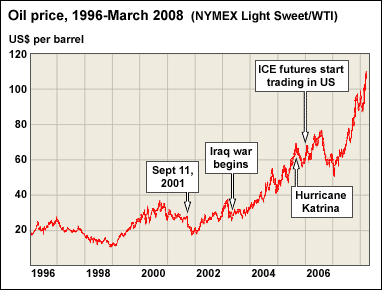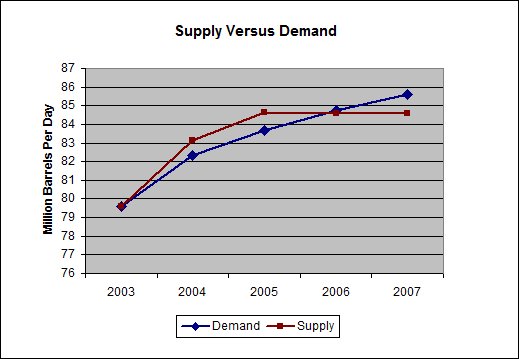Difference between revisions of "Oil price"
| Line 55: | Line 55: | ||
Peak oil is not about running out of oil, it's about the rate at which oil can be supplied to the market. If the rate at which it is demanded exceeds the rate at which it can be supplied, oil prices will go up. | Peak oil is not about running out of oil, it's about the rate at which oil can be supplied to the market. If the rate at which it is demanded exceeds the rate at which it can be supplied, oil prices will go up. | ||
*Inflation / | *Inflation / [[Declining Dollar]] | ||
In an attempt to stimulate the ailing U.S. economy, the the Federal Reserve has cut rates by three percentage points since September 2007. But the rate cuts are also inflationary, weakening the dollar and sending oil prices higher.[http://money.cnn.com/2008/04/29/news/economy/oil_dollar/] | In an attempt to stimulate the ailing U.S. economy, the the Federal Reserve has cut rates by three percentage points since September 2007. But the rate cuts are also inflationary, weakening the dollar and sending oil prices higher.[http://money.cnn.com/2008/04/29/news/economy/oil_dollar/] | ||
Revision as of 05:52, 23 July 2008
Description:
The oil price has been steadily increasing and has recently peaked close to 150 US$/barrel. The price rose to a record $1.4727 on July 11, 2008.[1]
The rate at which oil is demanded exceeds the rate at which oil is supplied is the driving force of this event. In 2005, for each barrel of oil discovered we consumed six and a half.[2]
This is mainly due to a high dependence on oil, world oil depletion and a steady increase of world oil consumption.
Enablers:
- Global economic growth spurs oil demand.
- Demand for Oil - Increasing
- Huge increase of oil consumption in Brics (Brazil, Russia, India, China)
- Oil dependence - heavy.
- Elasticity of Oil supply - very inelastic. Higher prices do not significantly increase oil production.
- Elasticity of Oil demand - very inelastic. Higher prices do not significantly deter oil consumption.
- Oil production - near peak. Spare production capacity acts as a cushion in the oil supply chain. A lower spare capacity diminishes the ability to absorb supply-demand shocks, leading to higher price.
- Oil refining capacity - near peak capacity.
- Oil shipping capacity - near peak capacity.
- Oil inventories low.
- Not enough oil contracts available for purchase
- Failure of international agreement to reduce oil consumption
- Oil spills [3]
- Intangibles - Politics in Middle east, Economic Uncertainty
Inhibitors:
- Global depression
- Decrease in oil dependence
- Development of a new or alternate source of energy
- Lower oil demand from lower energy consumption lifestyle changes
- Reduction of oil consumption through environmental awareness
- Increase in oil supply
- Massive new oil discoveries leading to more oil production
- A surplus of oil contracts available for purchase
- Increase in oil shipping capacity
- Energy consumption regulation
- Carbon tax
- International agreements to reduce oil consumption
- CAFE standards
- Increase in efficiencies
- Intangibles - Peace in Middle east, Economic stability
Paradigms:
- Supply and demand
It is thought by some that we are in Peak oil since 2006. Peak oil is the point in time when the maximum rate of global petroleum extraction is reached, after which the rate of production enters terminal decline.[4]
Peak oil is not about running out of oil, it's about the rate at which oil can be supplied to the market. If the rate at which it is demanded exceeds the rate at which it can be supplied, oil prices will go up.
- Inflation / Declining Dollar
In an attempt to stimulate the ailing U.S. economy, the the Federal Reserve has cut rates by three percentage points since September 2007. But the rate cuts are also inflationary, weakening the dollar and sending oil prices higher.[5]
Since the oil price is indexed to the dollar, as the dollar drops in value, the price of oil increases.[6] If one looks at inflation adjusted oil prices, they remain relatively flat.[7]
- Speculation
As the dollar continues to depreciate in value, investors have bought oil futures as a hedge against inflation.[8] It is thought that as much as 60% of today's crude oil price is pure speculation driven by large trader banks and hedge funds.[9][10]
- War
Oil prices are high because the United States is actively engaged in wars in Iraq and Afghanistan and perusing war with Iran in the middle east.[11]
- Resource Nationalism
"Resource nationalism" and political tensions in Nigeria, Venezuela, Iran and even Mexico are further constraining supply.[12] These oil producing countries would like to use the oil in their countries to develop the country rather than to make the oil available to world markets.
Experts:
Timing:
- 1965, Oil discovery rate peaked
- 1973, Oil shock. The fourth Middle-East Wars acted as trigger.
- 1991, Gulf war.
- 2003, Iraq war.
- 2007, Peak oil. World oil production peaked.
- 2008, The oil price has been steadily increasing and hits a record high at $147.27/barrel.

